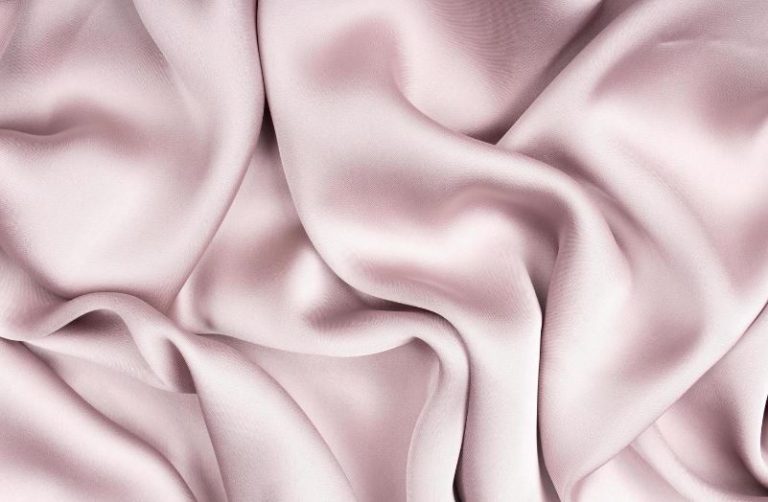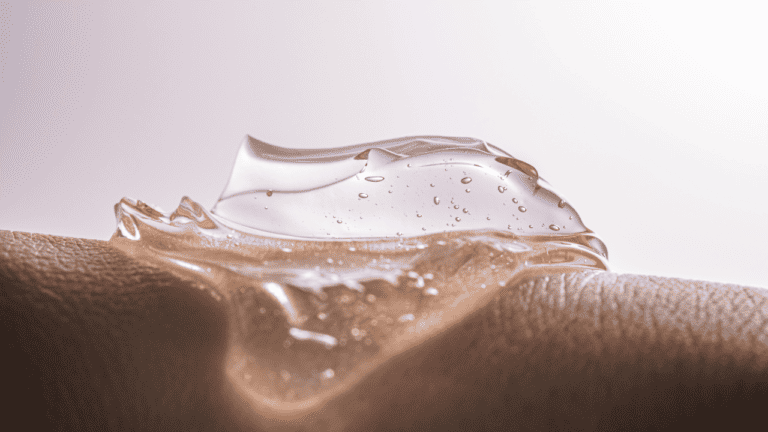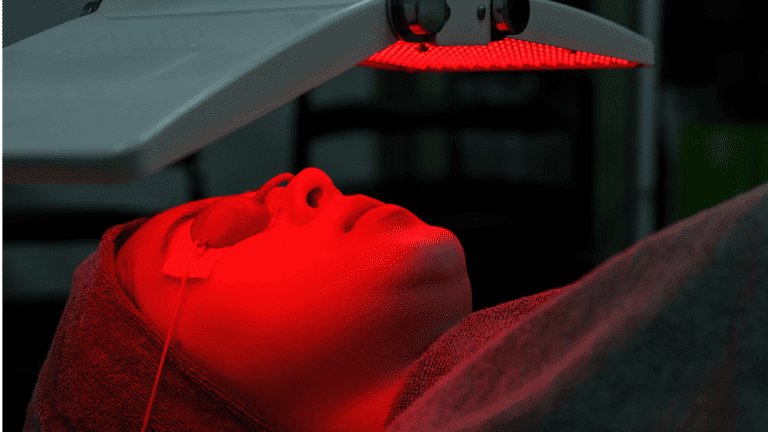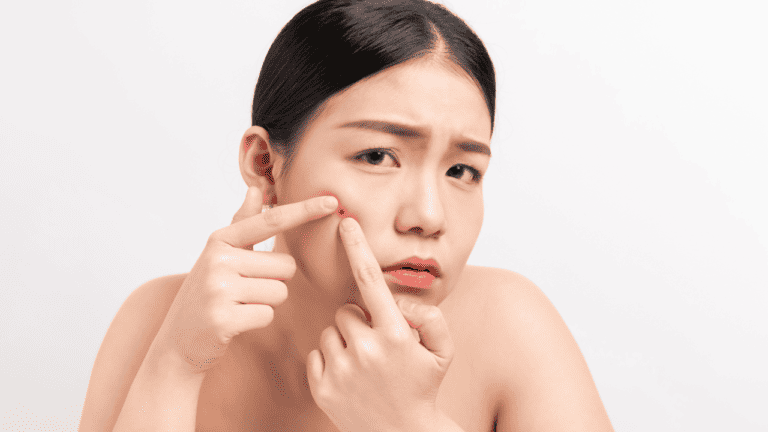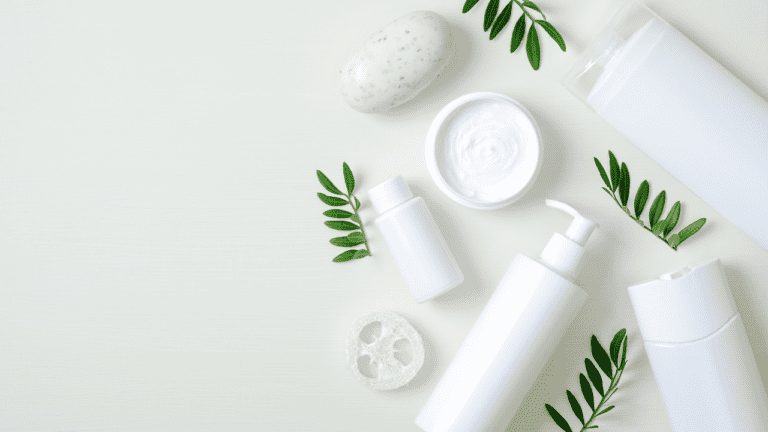Do you have a pore on your face that looks like a gaping hole? If so, you’re not alone, I myself am well acquainted with enlarged pores because of my oily and acne-prone skin. I used to feel uncomfortable with people standing too close because because they’d just be looking at my gaping pore. It’s frustrating looking at the hole because it feels like your skin has been irreversibly changed. You may also be worried that it’s just going to continue to grow over time.
Don’t worry, there are many steps you can take to not only minimize the appearance of enlarged pores but also to make them smaller permanently. It’s likely going to take more than simple skincare products, but it’s possible, and if you want to know how you could help your skin go back to its baby smooth ways, keep reading!
What Causes An Enlarged Pore?
If you have an enlarged pore that looks like a hole, knowing what caused it is the best way to prevent more from happening. There are several factors that can contribute to the appearance of enlarged pores.
- Genetics
- Excess oil production
- Sun Damage
- Wrong Skincare Products
Firstly, genetics can play a role. If your parents have enlarged pores, you are more likely to have them too. Additionally, as you age, your skin loses elasticity and collagen, which can make your pores appear larger. If your parents have big pores too, you could try asking them why they think they have enlarged pores (as long as it doesn’t offend them of course.) From diet to skincare products, upkeeping your collagen intake can help you combat this issue.
Another factor is excess oil production. When your skin produces too much oil, it can mix with dirt and bacteria which clog your pores and cause them to stretch out. This is especially true if you have oily skin or live in a humid climate. You’re going to want to continuously use skincare products that clear your pores daily.
Sun damage can also contribute to enlarged pores. Exposure to UV rays can damage your skin’s collagen and elastin, which can make your pores appear larger. If you enjoy sun-bathing, make sure to wear sunscreen and moisturize, especially if you think your genetics don’t favor you in the pore department.
Lastly, using the wrong skincare products can also contribute to enlarged pores. Harsh cleansers and exfoliators can strip your skin of too much, breaking the skin barrier which causes it to produce even more oil leading to clogged pores. Although we want our pores to be clean, sometimes we can be doing more harm to our skin than helping it by over-exfoliating it.
Summary: Keeping your pores clean with the appropriate skincare products is pivotal. It’s also essential to understand if your face simply produces excess oil or if you’re stripping too much natural oil from your skin because either of these situations can lead to the enlargement of pores. By pinpointing the root cause of the issue, we can then directly address and manage it, thus effectively controlling pore size.
Time To Boost Your Skincare Game
If you have enlarged pores that look like holes, the first step is to minimize and manage the situation. You don’t want your pores to get any larger, and once you go for professional treatments to reduce the size of your pores (we’ll get to that part) you want to know how to keep them small. Fortunately, here are some skincare products that you can get your hands on easily to manage your pores.
Oil Cleansers
It might seem counterintuitive to slather more oil on your face to get rid of oil, but it’s actually one of the best ways I’ve found to clean my own oily skin.
I’m sure you’ve heard the phrase “water doesn’t mix with oil”, so when we use water-based cleansers, it’s hard for us to cleanse our skin of dirt that has been mixed with the natural oils on our face. This is why, we should begin with an oil-based cleanser, and then we can use a water-based cleanser if we truly wish to do a double cleanse.
Oil Cleansers I Recommend:
- The Face Shop Rice Water Bright, Light Facial Cleansing Oil (An Affordable Option)
- Banila Co New Clean It Zero Original Cleansing Balm (A Favourite of Korea)
- Shu Uemura Ultime 8 Sublime Beauty Cleansing Oil (My Favourite Cleansing Oil)
Add Retinol To Your Skincare
Retinol, a form of Vitamin A, is widely recognized in dermatology for its ability to effectively address both enlarged pores and visible signs of aging. Specifically for us who have enlarged pores they help to regulate sebum production and increase cell turnover, meaning that our dead skin cells are shed more often making it harder for dirt to build up in our pores.
Retinols have become quite popular in the United States and Canada, and many skincare products with low concentrations of retinol are available in stores. Using them consistently over time will help top but stronger retinoids, like tretinoin (also known as Retin-A), require a prescription.
Retinol Serums I Recommend:
- Tree of Life Firming Retinol Serum (Clean and Cruelty Free)
- CeraVe Resurfacing Retinol Serum (Many people love this one and I find it’s very gentle)
Adding retinol to your skincare routine is a journey because our skin needs to get used to it over time. The very first time you use retinol, you may get something known as the “retinol uglies” where your skin starts to peel and look flaky. To prevent that from happening, I recommend starting with serums that have low concentrations of retinol, although this means that cell turnover rate will not be as fast.
If you somehow don’t get the “retinol uglies” you can definitely try getting stronger retinoids like tretinoin (also known as Retin-A). This require a prescription in the United States and in Canada, but it may be worth the effort because its a much stronger and faster-acting retinol because it’s a form of Vitamin A that can be readily used by the skin to help our skin texture.
Retinols have amazing anti-aging benefits because n the United States, skincare products with low concentrations of retinol are available over the counter, but stronger retinoids, like tretinoin (also known as Retin-A), require a prescription. Tretinoin is much stronger and faster-acting than retinol, as it’s a form of Vitamin A that can be readily used by the skin without needing to be converted.
Clay Masks To Help Unclog Pores
Upping your clay mask collection will help you absorb excess oil and reduce the appearance of our pores. Although they might not truly shrink them, learning to manage our oil production is vital to ensuring our pores don’t get any bigger than they already are.
There are different kinds of clays you could turn to that will target your specific skin needs. Typically people who experience enlarged pores also have very oily skin, so here are some of the best clays to look out for:
- Kaolin Clay: Kaolin clay is a very gentle type of clay that’s suitable for sensitive skin. It helps absorb excess oils and may help to soothe the skin. There are also variations of kaolin clay, like white, red, yellow, and pink kaolin, each having slightly different benefits. White kaolin is the gentlest and is great for dry and sensitive skin, while red kaolin is more suitable for oily skin.
- Bentonite Clay: This clay is derived from volcanic ash and is very absorbent meaning it’s a fantastic choice for very oily skin. It’s also able to draw out impurities from the skin due to its negative electrical charge, which can help unclog pores and reduce acne.
- Rhassoul Clay: Also known as Moroccan Red Clay, rhassoul clay is rich in minerals and is known for its exceptional absorbing properties. It is good for oily skin as it can pull out blackheads and other impurities.
- Dead Sea Mud: Not technically a clay, Dead Sea mud is packed with skin-friendly minerals like magnesium, calcium, and potassium. It is known for its detoxifying properties, helping to draw out impurities and absorb excess oil.
Try using a clay mask at least one a week, just remember that this is a constant upkeep. It’s too common for us to buy a face mask and then leave it in the cupboard unused. Leave on for 10-15 minutes, then rinse off with warm water.
Tips: Make sure to use a good moisturizer after you cleanse your skin or use clay masks of any kind. Making sure your skin is moisturized is crucial to preventing excess oil production.
Professional Treatments You Can Do At Home for Enlarged Pores
While it’s normal to have some visible pores, enlarged pores can be frustrating, and everyday skincare products can only take you so far. Fortunately, there are some professional treatments that we could do at home for ourselves to make our pores smaller.
1. Chemical Peels
Chemical peels are skin-resurfacing procedures that can be implemented both professionally and at home, depending on the intensity and type of peel. These treatments use strong acid solutions to exfoliate the top layer of the skin, helping to reduce the appearance of enlarged pores and improve skin texture. They are categorized into three primary levels: superficial, medium, and deep peels.
Superficial chemical peels, often referred to as “lunchtime peels,” typically use mild acids like alpha-hydroxy acid to lightly exfoliate the skin. They’re gentle enough to be used at home and can enhance skin texture and tone and could be used every day:
- Dr Dennis Gross Alpha Beta Extra Strength Daily Peel (great for beginners)
- QRxLabs Glycolic Acid 20% Resurfacing Pads (Strong Acidity)
Medium peels go deeper into the skin and use ingredients like trichloroacetic acid or Jessner’s solution to address more serious imperfections such as wrinkles and shallow scars. These are usually performed by professionals. It is possible to do these yourself at home, but I highly recommend seeing a professional because you don’t want to risk the chance of scarring.
Lastly, deep peels, utilizing strong agents like phenol, penetrate several layers of skin and require professional administration and longer recovery time. They’re typically used for more serious skin issues such as deep wrinkles or scars. The decision to undergo any of these peels should be based on individual skin type, needs, and consultation with a skincare professional.
2. Microdermabrasion
Microdermabrasion involves using small crystals or a diamond tip on a hand-held machine that can remove the upper layer of the skin and stimulate new skin growth. More gentle in comparison to chemical peels, microdermabrasion is a physical exfoliation instead of a chemical exfoliation meaning it’s more suitable for people with sensitive skin.
You could go for a microdermabrasion facial to treat yourself, but I find that using the at-home microdermabrasion tools seems to work just as well. Plus you can then control how much exfoliation you need based on the physical sensation of the tool on your very own skin.

At-Home Microdermabrasion Tools:
- Microderm GLO GEM Diamond Microdermabrasion and Suction Tool (It has a 2-in-1 function that lets you suck out gunk and exfoliate your skin with
Skin Treatments By Professionals Only
At-home treatments usually take a long time to see results, so if you’re looking for a dramatic change in a short period of time, here’s a list of treatments that should only be carried out by professionals that you could consider:
Intense Pulsed Light (IPL) Therapy: IPL uses multiple wavelengths of light to treat various skin conditions, including large pores. It can help stimulate collagen production and improve the overall texture of your skin.
Deep Chemical Peels
Deep peels use strong chemical agents like phenol or trichloroacetic acid to penetrate the lower layers of the skin, leading to a significant reduction in visible skin issues, including pore size. These treatments can require sedation or local anesthesia and several weeks of recovery time.
Ablative Laser Resurfacing
I’m sure you’ve heard of laser treatments before but you should know specifically about Ablative laser treatments, like CO2 and erbium lasers, because they remove layers of skin to promote the growth of new, healthier skin. They offer significant improvements in skin texture and pore size but come with longer recovery times and higher risk of side effects compared to non-ablative lasers.
Overall, professional treatments can be an effective way to reduce the appearance of enlarged pores. However, it’s important to talk to a licensed skincare professional to determine which treatment is right for you.
Dermabrasion
Dermabrasion is a procedure that involves a dermatologist “sanding” your skin with a special instrument. It’s similar to microdermabrasion but much more thorough and goes deeper, which is why it should only be performed by a professional.
This process removes the outer layers of skin to promote the growth of new skin. This treatment can be quite effective for larger pores and acne scars, but recovery can take several weeks and there’s a risk of pigmentation changes.
Microneedling
Microneedling is a treatment that involves using a device with tiny needles to create small punctures in the skin. This can help to stimulate collagen production and improve skin texture however it’s quite an invasive procedure because it is physically creating tiny holes in your skin, so be prepared to see a lot of redness after the procedure.
Microneedling does help reduce the appearance of large pores so it might be worth it, but if you’re squirmish, perhaps this isn’t the treatment for you. This treatment is typically done in a series of sessions for best results.
Conclusion For Dealing With Enlarged Pores
Enlarged pores can be a source of frustration for many people, you and I included. Now that you know all the skincare treatments and products you could add to your skincare routine, I encourage you to try the ones that you are most comfortable with! Your pore didn’t enlarge itself overnight so remember that it will take some time for it to get smaller as well. With that said, here are a few more tips for you to manage your pores:
Daily Habits to Prevent Enlarged Pores
- Keep your face clean: Regularly washing your face with a gentle cleanser can help remove excess oil and dirt that can clog your pores. Be sure to avoid harsh scrubs or cleansers that can irritate your skin.
- Use a toner: Toning your face can help remove any leftover dirt or oil that your cleanser may have missed. Look for toners that contain salicylic acid or glycolic acid, which can help exfoliate your skin and keep your pores clear.
- Moisturize: Keeping your skin hydrated can help prevent your pores from enlarging. Look for lightweight, oil-free moisturizers that won’t clog your pores.
Dietary Changes to Prevent Enlarged Pores
- Drink plenty of water: Staying hydrated can help keep your skin looking healthy and prevent your pores from becoming enlarged. Aim to drink at least 8 glasses of water per day.
- Eat a balanced diet: Eating a diet rich in fruits, vegetables, lean proteins, and healthy fats can help keep your skin looking healthy and prevent your pores from becoming enlarged.
- Limit your intake of processed foods: Processed foods can be high in sugar, salt, and unhealthy fats, all of which can contribute to enlarged pores. Try to limit your intake of these foods and opt for whole, nutrient-dense foods instead.
By following these simple tips, you can help prevent enlarged pores and keep your skin looking healthy and radiant. Remember to be patient, as it may take some time to see results.

